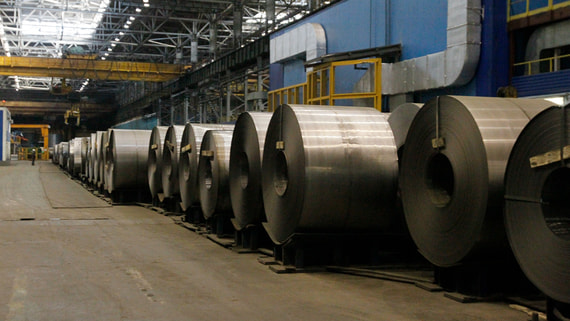Turkey has increased import duties on flat products
[ad_1]

Turkey has raised import duties on flat products. This was reported by the industry agency Steelorbis with reference to the publication in the official publication of the Turkish authorities Official Gazette dated January 28, 2023 (available from Vedomosti).
The import duty on hot-rolled (HA) coil has been increased from 9% to 15%, on cold-rolled (CR) coil – from 10% to 17%. For companies that use HA-roll for further processing, as well as for the manufacture of welded pipes, the duty increased from 6% to 13%, and for manufacturers of household appliances, the duty for HC-roll increased from 7% to 15%. The duties on thick sheets have also been raised from 9-15% to 15-20%.
According to the industry agency Metals & Mining Intelligence (MMI; is a provider of information for calculating the excise on steel for the Federal Antimonopoly Service and market monitoring for the Russian Ministry of Finance), Turkey was the largest export market for Russian uncoated (uncoated and unpainted) rolled products in 2022.
Exports of hot-rolled coil from Russia to Turkey, according to MMI, decreased by 15% in 2022 to 1.3 million tons. – says MMI development director Ilya Kolomeets. “It is also possible that not all Turkish buyers were able to continue working with Russia after the imposition of sanctions.”
According to the Association of Turkish Steel Producers (TCUD), cited by Steelorbis, Turkey imported 7.79 million tons of flat products in 11 months of 2022 against 9.43 million tons in the whole of 2021. Vedomosti sent a request to the association. Representatives of the largest manufacturers of flat products in Russia – NLMKSeverstal and MMK – declined to comment.
“The increase in import duties on flat steel in Turkey will have an extremely negative impact on Russian metallurgists,” a source in the metallurgical company told Vedomosti. “These measures put domestic steelmakers in an uncompetitive position in the Turkish market compared to countries that have a free trade agreement with Turkey and thus do not pay any duties. We will apply to the Ministry of Economic Development of the Russian Federation so that the issue of increased duties is raised at the interstate level.”
Turkey has 22 duty-free trade agreements, including with South Korea, Egypt, Tunisia, Singapore, Venezuela and the United Kingdom, according to the Turkish Ministry of Commerce website. Vedomosti sent a request to the press service of the Ministry of Economic Development of the Russian Federation.
The head of the Turkish Steel Exporters Association (CIB), Adnan Aslan, has previously complained about the too high share of energy costs in the cost of local steelmakers, which makes them increasingly less competitive compared to suppliers from other countries, wrote industry agency Kallanish on January 26, 2023. Aslan noted that the losses of the steel industry will negatively affect chains in other industries, so protecting and strengthening the domestic steel industry should be a priority. He also requested that the necessary measures be taken to prevent imports at “dumping prices”.
“Capacities for the production of flat products in Turkey are growing, and the country, naturally, wants to use import duties to ensure that they are loaded,” an international trader told Vedomosti. According to the World Steel Association (Worldsteel), steel production in Turkey in 2022 fell by 13% to 35.1 million tons.
According to the trader, the increased duties introduced at current prices are not prohibitive for Russian metallurgists, but they will reduce the margins of their sales. Also, they may have to sell products of lower processing to Turkey – slabs, from which flat products are made. According to the trader, the Russian GL-roll in Turkey is now offered at a price of $715-735 on a CFR basis (with delivery to the port). And the price for the local HA-roll is at the level of $750-765/t on the basis of ex-works (at the gates of the plant).
“The measures were introduced so unexpectedly that questions arise – what will happen to the goods that are already loaded in ports or going by sea, will this be the price with the old duty or already a new one?”, – says the source of Vedomosti.
The Turkish authorities care first of all about domestic producers, stresses a commodity market analyst “Opening Investments” Oksana Lukicheva. “Apparently, Turkish factories have become less competitive relative to other manufacturers, and the authorities decided to support them in the domestic market, which is normal,” the expert says. She notes a significant drop in export deliveries from Turkey to the main consumer countries in 2022. According to CIB, the export of steel products from Turkey in 2022 fell by 18% to 19.6 million tons.
According to Lukicheva, the profitability of deliveries of steel products to Turkey, taking into account the increased duty, will depend on the production cost of a particular company. “It is likely that the supply will remain profitable, and therefore it will not be necessary to redirect the flow of goods to other markets,” the expert says. Dmitry Smolin, senior analyst at Sinara investment bank for metallurgy and mining, believes that the increase in duties on HA coil from 9% to 15% is unlikely to mean a halt in the export of steel products to Turkey from Russia, “just the margin for such deliveries will most likely decrease “.
According to Smolin, the profitability of export sales from Russian metallurgists is now noticeably lower (including for deliveries to Turkey) than on the domestic market due to the fall in steel prices in 2022. According to MMI, export prices for Russian hot-rolled coil by FOB Black Sea decreased from $783/t in January 2022 to $566/t in December of the same year.
Export prices for Russian GC steel have grown by 10-15% since the beginning of the year to $660/t, which should compensate for the increase in duties, he calculated.
[ad_2]
Source link





